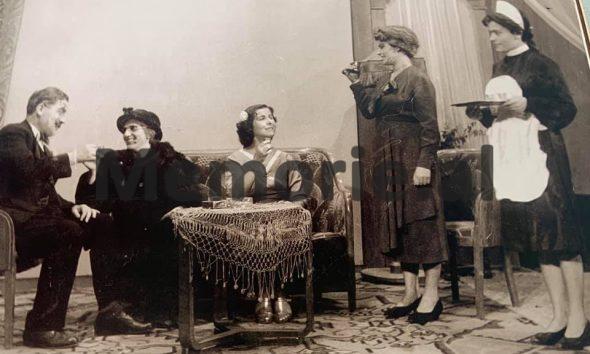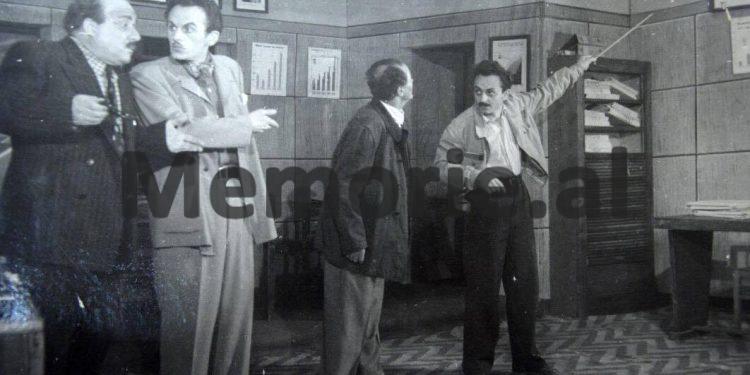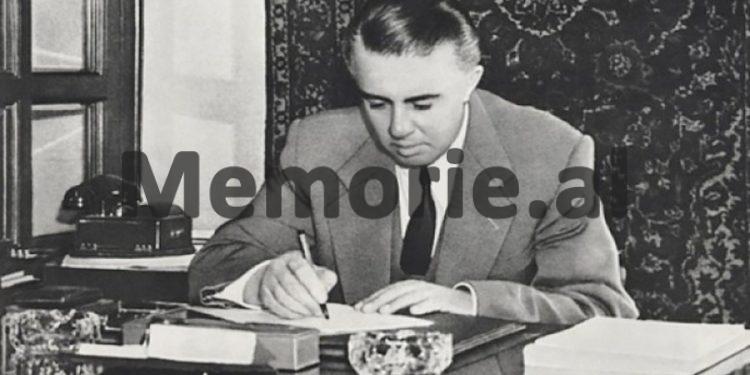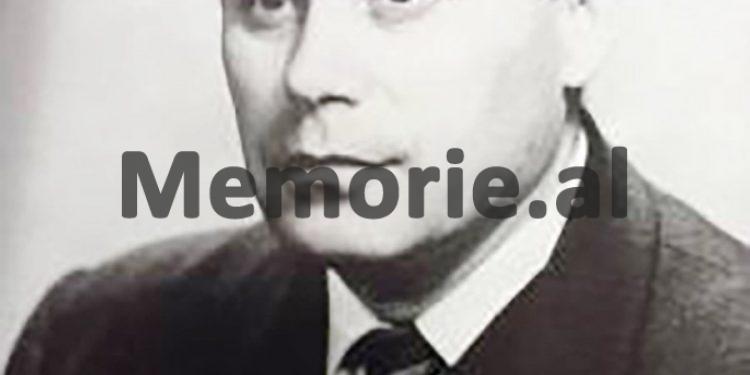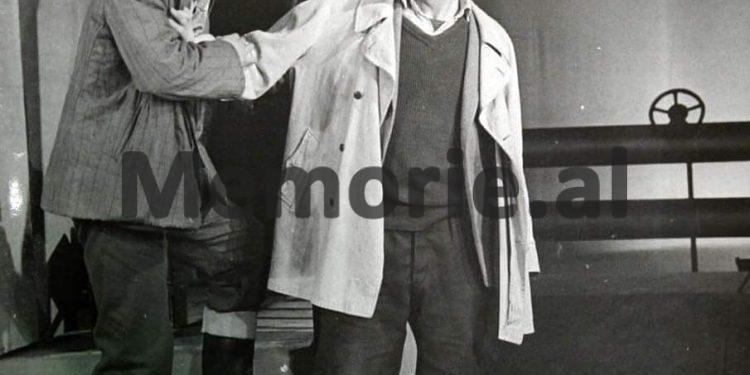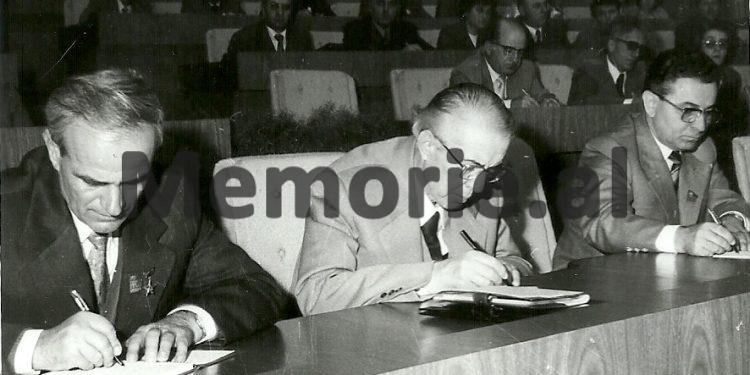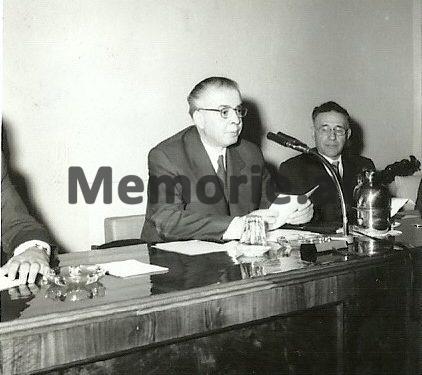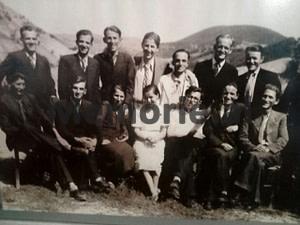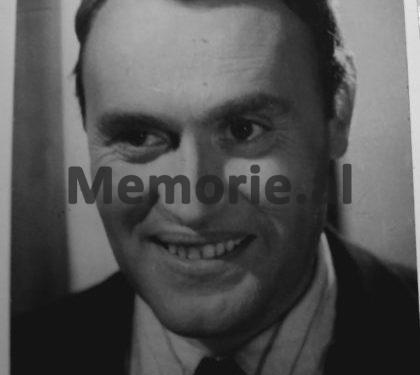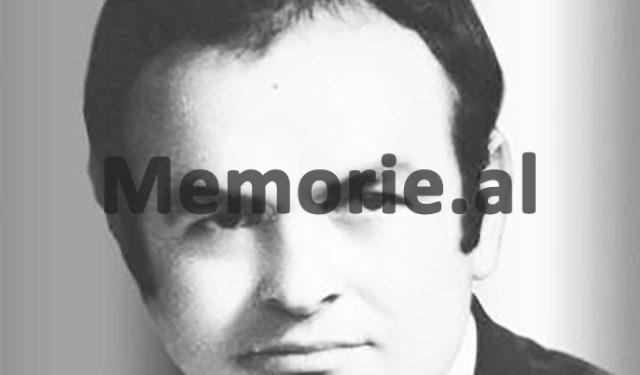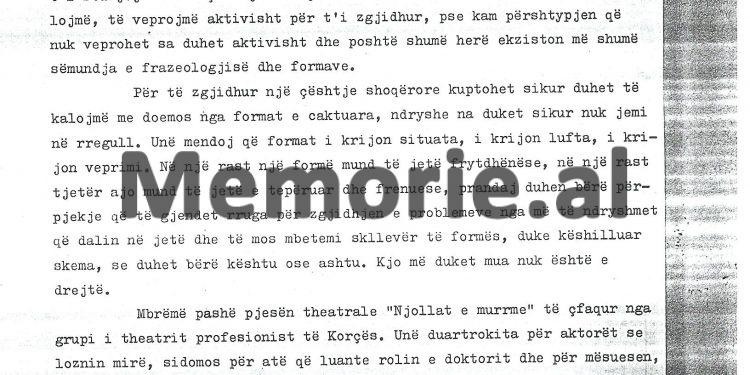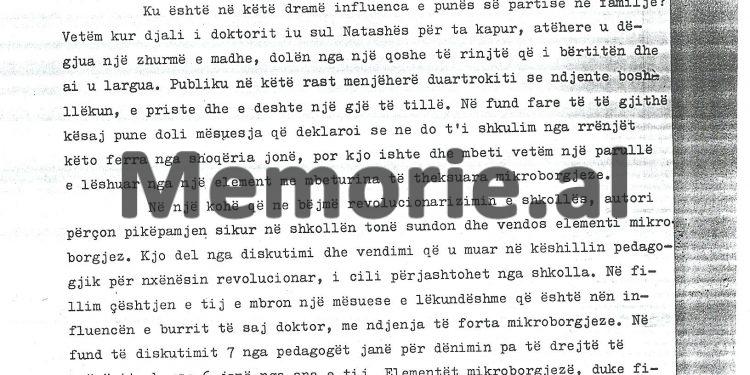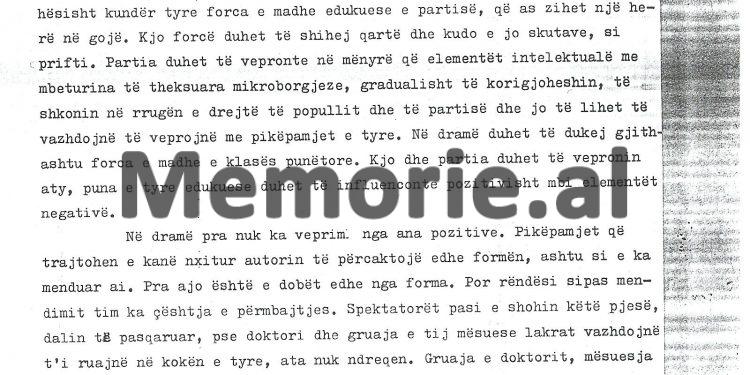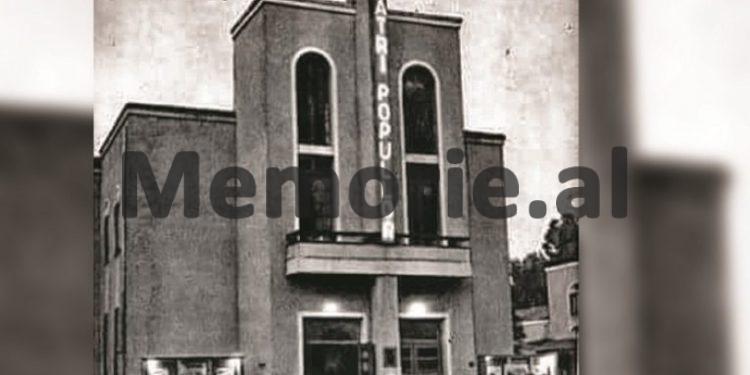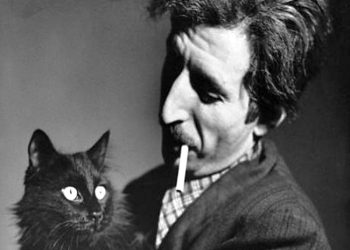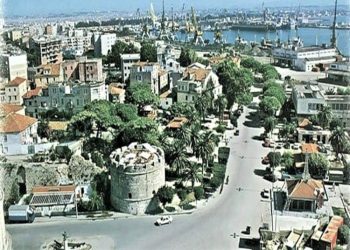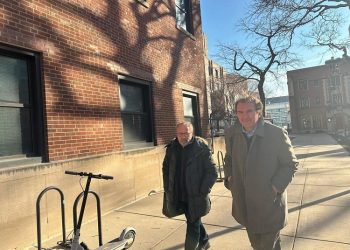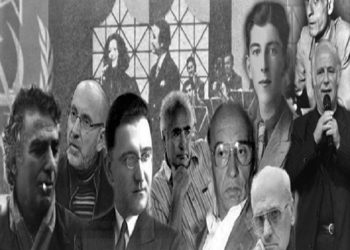Dashnor Kaloçi
Second part
Memorie.al publishes the unknown story of the drama “Brown Spots” by playwright Minush Jero, which was first staged by the famous director Mihallaq Luarasi, at the “Andon Zako Çajupi” Theater in Korça where he won the cup of the festival of dramatic theaters and was considered superlative by the then Prime Minister, Mehmet Shehu, but sometime later when she appeared on the stage of the People’s Theater in Tirana, where Enver Hoxha himself was in the lodge, she was criticized and hit by him, as a drama where the working class force did not come out and the micro-bourgeois sentiments dominated ”etc. All the words of Enver Hoxha held at the meeting of the Secretariat of the Central Committee of the ALP, where he ‘crossed’ that part and its authors, calling them ‘stained people’ as well as the discussions of the officials of the Ministry of Education of Culture, such as Miho Gjini, etc., and the actors of the “Aleksandër Moisiu” Theater of the city of Durrës, such as: Spiro Urumi, Nikolin Xhoja, Llazar Ziu, etc., who issued harsh accusations against their colleagues who had performed in that parts, as well as the self-criticism of the playwright Minush Jero and the director, Luarasi, after the ‘lightning bolts’ issued by the main leader of the Party towards their work!
The play “Brown Spots”, by Minush Jero (which was performed on the stage of the Metropolitan Theater in 2016 in Tirana), is one of the most talked about and discussed theatrical plays before the ’90s and almost throughout the period of the communist regime of Enver Hoxha.
“Brown spots”, staged by the famous director, Mihallaq Luarasi who appeared as a premiere at the national meeting of professional theaters in the city of Korça in October 1969, was considered extraordinary by the then Prime Minister , Mehmet Shehu and she were awarded the first prize, but when it was given in Tirana sometime later, where in the loggia was the main leader of the Party, Enver Hoxha, she was anathema by him.
In one of the meetings of the Secretariat of the Central Committee of the ALP, Enver Hoxha himself dedicated one of the items to the agenda, even analyzing it in detail as if he were a literary critic. This would be just the prologue of a ‘storm’ that Enver Hoxha was undertaking against the people of literature, art and culture, which would culminate with the 11th Song Festival on Radio-Television, where again Enver himself would anathema and would be thrown into an unprecedented attack on its perpetrators.
While these events are already known, Memorie.al is publishing the speech of Enver Hoxha at the meeting of the Secretariat of the Central Committee of the ALP, in 1969, where he struck for the first time “Brown spots” and in the following issues , we will publish the “crossroads” that was made to this drama by senior officials of the Arts and Culture in the Central Committee of the ALP, officials of the Ministry of Culture, as well as colleagues of Minush Jeros and Mihal Luarasi, in the theater Aleksandër Moisiu ”of the city of Durrës, which we have extracted from secret documents (already declassified for years), which are located in the Central State Archive, the fund of the former Central Committee of the ALP, where like most of the documents of this book, are published in full and without any abbreviations.
Continued from the previous issue
Information-report of the Ministry of Education and Culture on the discussions for the drama ‘Brown spots’
I n f o r m a c i o n
ON THE DISCUSSION ABOUT THE DRAMA “BLACK SPOTS”
In order to analyze the ideological errors of the drama “Brown Stains”, meetings of the party’s basic organizations were held at the Ministry of Education and Culture, the editorial office of “Zeri i Popullit”, the Writers ‘and Artists’ League, the High Institute of Arts and the People’s Theater. In some of these meetings, both in the Ministry of Education and Culture and in the Institute of Arts, many other non-partisan employees who deal with art problems were invited.
In these meetings many communists discussed the mistakes of drama. They, noting and condemning the pointed weaknesses of the offense, saw with self-critical eyes their erroneous attitudes towards it and held on before being signaled by the party.
On the other hand, they set out tasks and problems for a more systematic work in the future, regarding their Marxist-Leninist education as well as the organization of debates about the problems that preoccupy the revolutionization of literature and the arts.
Following the meetings of the party’s grassroots organization, the Ministry of Education and Culture, together with the Writers and Artists League, organized a wide-ranging discussion, in which, in addition to many writers and artists from the capital, directors and directors of dramatic theaters, branch presidents were invited. of the League, etc.
In these meetings came the spirit of discussions that took place in grassroots organizations.
All 13 discussants, including the author and the director of the play, condemned the drama “Brown Spots” as an objective, fatalistic work that promotes our reality, which shows the process of decline and not growth, which does not condemn, but calls the stains of society indelible, which discredits the school, society, etc.
Discussing the errors of the work, among others, the following thoughts were concretely expressed:
-In drama many revolutionary ideas are spread and they are not fought.
-It turns out that the characters of the work are victims of socialism.
To create the impression that the party’s ideas in relation to the phenomenon are micro-bourgeois.
She, instead of erasing the stains, shows their triumph.
-Instead of showing the great danger of the microbourgeoisie and the bourgeoisie, it creates the impression that they are invincible.
-The work deals with people crawling in life, not with what is essential and defining.
-Instead of telling us about the joys of knowing the phenomena and the pleasure of transforming life, drama evokes sadness and despair, because the author affirms megativity and does not bring out the positive.
The author of the work, Minush Jero, accepting the remarks made to the drama, condemned it as an ideologically failed work and expressed the opinion that he will make the most complete self-criticism by writing a work that reflects the opposite of “Brown Stains” … The director of the play, Mihal Luarasi, while making the self-criticism, rejected the spectacle and stressed that the play could not express anything other than those ideological errors contained in the work.
While Kudret Velça, who greeted the work with his article published in “Zeri i Popullit”, condemned the drama, but was reluctant to admit that in his writing he expressed a wrong view when he raises the issue, that the solution of problem, but its paving. Also, in their discussion the members of the noise, condemning the act made self-criticism and underlined that their mistake lies in the fact that they could not evaluate the show and the act, in light of the lessons of the party and Comrade Enver.
It was unanimously expressed that “Brown Stains”, being fundamentally wrong, cannot hold the flag of the Festival. On this issue, the collective of the Theater “Andon Zako Çajupi”, condemning the work, has expressed the opinion to return the flag, but we think this should be done without fuss.
All the discussants pointed out that the unfair evaluation of the work “Brown Stains” stems from the fact; that they do not fight persistently for their application to art, that they do not fight persistently for their application in practice, that Marxist-Leninist principles are not well known, that they are not completely liberated from foreign aesthetic views and that they are influenced by them, that There is still little work to be done on the ideological training of writers and artists, that they do not go deeper into the analysis of life phenomena, etc.
Although the discussions described in the spirit of social criticism and optimism, focused mainly on those issues we noted above, some ideological and organizational problems emerged that need to be seen by us and the relevant bodies. Thus, it was said:
-Our dramaturgy should not deal with placing the negative character at the center of the work. The main character must always be under attack.
Without making the working class figure a hero, there can be no socialist art.
-To organize well the fight against foreign stains and tastes that appear in the field of art.
-In the future, the festivals should not be organized only with spectacles of one season, but in them to represent the best creativity in the period between the two festivals.
-To better organize the work of the noises, so that they have time to judge the deeds and to listen to the mass opinion.
-The issues of revolutionization of literature and arts become more of a problem for the basic organizations of the party in the relevant bodies and institutions.
-The meeting expressed the opinion that “Brown Spots” should be discussed in all theaters in the country, linking this discussion with the problems that preoccupy the revolutionization of the scene.
-Regarding what we laid out, a material has been prepared that these days will be published as an editorial article of the newspaper “Zeri i Popullit”.
Tirana, on 15. XI. 1969 CULTURE SECTOR
Report-information of the instructor Miho Gjini of the Ministry of Education and Culture
NOTES FOR THE DRAMA OF MINUSH JEROS
“History of a night”, performed by the dramatic theater of Gjirokastra and published by the publishing house “Naim Frashëri”
Here Minush Jero is a consequent of the philosophical platform of the drama “Brown Spots”, that our society is always in denigration and is blown inwards by its own people. The drama “History of a Night” is described by the idea of the danger of spiritual and physical annihilation of the “stained” man in today’s society.
After mutilating him spiritually, presenting him as barbaric and with an animal spirit, the author throws the Myrteza coachman under the wheels of the car. During the development of the drama in this man he sees the psychology of the animal, giving the whole dramaturgical action a general sense of fatality.
The author sees non-antagonistic contradictions among the people as contradictions of antagonistic character. The bodyguard Myrteza, the author fiercely opposes the daughter, who loves a boy, so much so that gradually the features of a primitive man stand out in him. It is no coincidence that the author makes that coachman, who carries the garbage of the streets and measures everything in life with the step and the spirit of the horse that pulls the cart. Myrtezai only that he has no horse bridle, that he is conceived as a stubborn animal.
Here is what he says during the drama: “In the past, animals were given food because they were beaten if they ate together. “Now they share it with people.” “I did not push him today, but I whipped the horse. “It means I’m weaker than him.” “In the evening he says to his daughter, ‘I beat Kuqon, because he blew me up, crawling in the evening to beat you, because I woke up late at night.’ “I had a horse that worked with me for ten years and tonight… you killed me.” Even this crippled man, when his horse died, takes with him as a sign of consolation his horseshoe, which is ready to roll over his daughter’s head. Even the team where he works says that Myrtezai is no different from the animal he works with (“Everyone in the team says that Myrtezai has a carriage with two horses, Kuqon and himself”.
Myrteza’s character has nothing good or beautiful. The whole is clothed in the psychology of human savagery. Opposing him to the daughter and son she loves, the author also realizes here a categorical opposition of generations. The new generation cannot get along with the old generation, which is destined to end up under the wheels of the car. But before we get here, according to the author, they have to be dragged to life until the last gasp (“Behind these asphalts” – he says: – I will crawl and you will crawl with me “).
Myrteza’s protest in this hermetic event, where the voice of society is not heard at all and when it rains constantly and the weather is bad, it sounds like a wailing in the desert. The only one who participates in this mourning is his neighbor, a professor, who in terms of worldview and moral physiognomy has nothing in common with our teachers and school. He is the type of bourgeois intellectual hidden in our ranks that the author has sung from Arthur Miller’s Freudian dramaturgy.
I would say that the whole drama is a bad copy of Arthur Miller’s drama “View from the Bridge”. The only difference is that Edi Karbone is divided by the author into two persons: in Myrtezana which represents his savagery and animalism and, in the professor, who carries the Freudian theory in love relationships. When Shpresa, Myrteza’s daughter, was 11 years old, Bujar caressed her like a child, when she comes to the age of 14, she sees him through the eyes of a teacher and when she reaches the age of 16, she sees in her “only the woman” (page 75).
All the contradictions that are then included in the drama, among which is Bujar, are based on this biological impulse. The opposition that Shpresa makes to him arouses in Bujar the fiercest anger so much that his character begins to resemble that of Myrteza. It is precisely these relations and this displacement of characters and contradictions between them that the bourgeois ideology seeks to achieve through Freud’s psychoanalysis.
Through Bujar, whom the author defends at the end of the drama, ideas are thrown against our reality. He sees our reality as a small tent (“the sky is like a tent”) on which it constantly rains and there is nothing beautiful (“Outside it is cloudy and rainy weather. What a beautiful thing there is under this sky gray”), but rather everything to collapse like in a grave (“Everything collapsed along with those ruins that have been turned into a grave of memories”).
Does he want to return to the bitter past, which worries her so much? Yes, he does. This leads us to the distorted and reactionary philosophy of this drama, which tries to fight the conservatism and patriarchy of the people living in socialism, with the eye of today’s bourgeoisie and modern revisionism. /Memorie.al
23.XII.1969 Miho Gjini
Continues in the next issue




